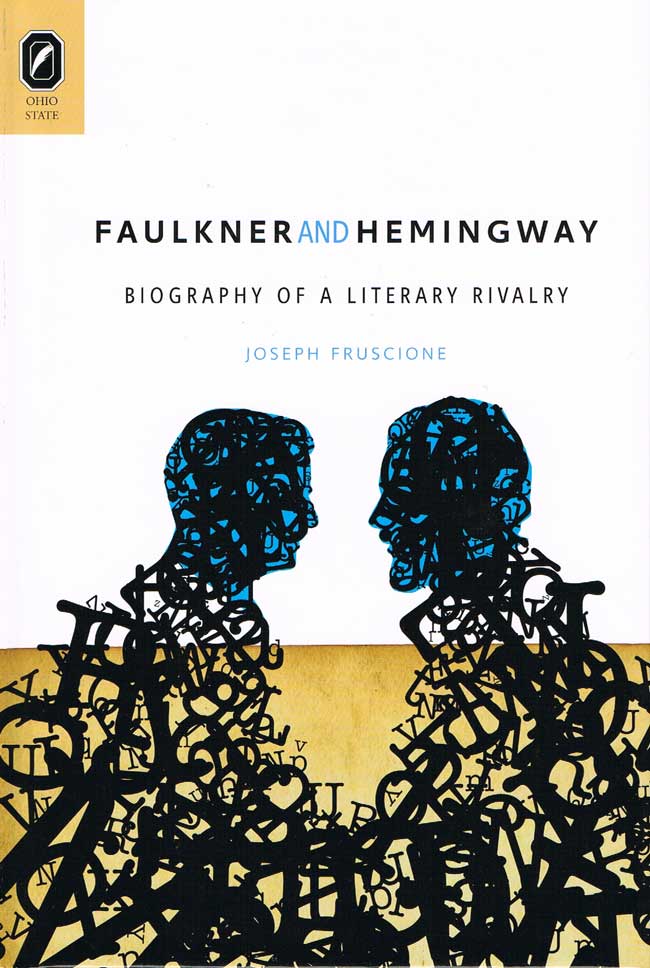Faulkner and HemingwayBiography of a Literary RivalryJoseph Fruscione |
 1/03/2012 Literary Criticism/American/General 263 pp. 6x9  $49.95 cloth 978-0-8142-1174-8 Add cloth to shopping cart $14.95 CD 978-0-8142-9275-4 Add CD to shopping cart $24.95 paper 978-0-8142-5233-8 Add paper to shopping cart Shopping Cart Instructions Review/Change Shopping Cart & Check-out | |||
|
Table of Contents
Explore More Joseph Fruscione’s lecture at the Library of Congress on Faulkner and Hemingway The Ernest Hemingway Collection (John F. Kennedy Presidential Library and Museum) The Hemingway Society (including the Hemingway Letters Project) |
“Joseph Fruscione takes a long and always responsible look at the important and fascinating subject of the Faulkner–Hemingway rivalry, demonstrating along the way that there were losses to both writers, but, however perversely it seems to be, there were also enormous gains for their writing. It contributes significantly to the scholarship on these two literary giants, as well as shedding light on the intriguing ways rivalry can diminish the individual who writes the book even as it spurs him on to do more and often enough write better books.” —George Monteiro, professor emeritus of English, Brown University “In his carefully and systematically researched book, Joseph Fruscione provides Faulkner and Hemingway scholars and students with what I qualify as the definitive study on the lifelong relation between the two writers. He provides insights not only into the various ways Faulkner’s and Hemingway’s careers intersected, but also into the implications that such intersections had for the shaping and evolution of American Modernism.” —Manuel Broncano, professor of American literature, Texas A & M International University “Joseph Fruscione’s study is the best, most balanced account ever produced of the artistic relationship between William Faulkner and Ernest Hemingway. Their careers dominate twentieth-century American literature, and, as this book shows, the example and work of each writer informed and influenced that of the other. Both men recognized the value of the other, and Fruscione goes a long way toward explicating the complexities of admiration and jealousy on the part of both. Fruscione is not a partisan of either writer; his book is one of sound, objective scholarship and writing.” —Robert W. Trogdon, Kent State University In the first book of its kind, Joseph Fruscione examines the contentious relationship of two titans of American modernism—William Faulkner and Ernest Hemingway. At times, each voiced a shared literary and professional respect; at other times, each thought himself the superior craftsman and spoke of the other disparagingly. Their rivalry was rich, nuanced, and vexed, embodying various attitudes—one-upmanship, respect, criticism, and praise. Their intertextual contest—what we might call their modernist dialectic—was manifested textually through their fiction, nonfiction, letters, Nobel Prize addresses, and spoken remarks. Their intertextual relationship was highly significant for both authors: it was unusual for the reclusive Faulkner to engage so directly and so often with a contemporary, and for the hypercompetitive Hemingway to admit respect for—and possible inferiority to—a rival writer. Their joint awareness spawned an influential, allusive, and sparring intertext in which each had a psychocompetitive hold on the other. Faulkner and Hemingway: Biography of a Literary Rivalry—part analytical study, part literary biography—illustrates how their artistic paths and performed masculinities clashed frequently, as the authors measured themselves against each other and engendered a mutual psychological influence. Although previous scholarship has noted particular flare-ups and textual similarities, most of it has tended to be more implicit in outlining the broader narrative of Faulkner and Hemingway as longtime rivals. Building on such scholarship, Faulkner and Hemingway offers a more overt study of how these authors’ published and archival work traces a sequence of psychological influence, cross-textual reference, and gender performance over some three decades.
| |||

